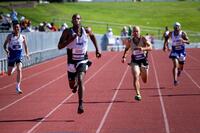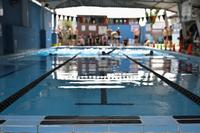There are few topics that cause as much conflict between myth and fact as climate change, but this one comes really close: At what age should a pre-teen or early teenager start lifting weights?
Will lifting weights stunt the growth of a teenager? If you research the topic online, you will see many opinions like "it may stunt growth," but you will not find any scientific research that backs them up. But you will find many scientific studies and opinions based on research that say teenagers can lift within certain parameters.
Here is the question that prompted my response:
Stew, I am a 15-year Army veteran, and my 13-year-old son wants to do some PT with me -- even lift some weights. I have read some of your previous writing about how you started working out in your early teen years, so I'm pretty sure I know what your response will be. But is there any science out there that specifically shows that lifting weights in your early teens will not stunt your growth?
In a nutshell: Yes, it is a myth. Unless a weight drops on your growth plate, you will not stunt your growth lifting weights. You have a greater chance of stunting growth by breaking bones near your growth plates by playing football, soccer or gymnastics than by lifting weights.
But don't take my word for it; check out scientific studies and books. Author of Strength & Power for Young Athletes, Dr. Avery Faigenbaum has performed research on the topic for years. He states:
There are many benefits to starting children on a strength training program at an early age, including:
-
Increased strength and power
-
Improved body composition
-
Greater self-esteem
-
Reduction in sports training injuries
-
Enhanced sports performance
This proven, research-based book provides young people ages 7 to 15 with a solid fitness base and aerobic activities and stretching exercises. It also presents the principles and practical applications of developing age- and sport-specific, strength-training programs.
This British Journal of Sports Medicine study has many elements and parameters for safety to a successful training program for young athletes.
The National Strength and Conditioning Association has an in-depth review of related literature on the topic and posted a thorough statement on the topic as well.
NSCA Youth Resistance Training -- Hot Topic Series
Final Verdict
My recommendation is not to start a young athlete on weights without a well-rounded athletic foundation. Take a solid year or more to work on a calisthenics-based program (push-ups, pull-ups, dips, squats, lunges, plank poses and a variety of core exercises, to name several) to build a solid foundation of resistance training without weights.
As you progress through the calisthenics base, start adding other gear such as dumbbells, barbell basics, suspension training (TRX) and even machines to progress logically to and through the overload process. Once you start allowing your child to lift weights, do not have them attempt your personal program. Prioritize technique and proper skills focus over how much weight they can do. Keep repetitions in the 10- to 15-rep set range.
As the new weightlifter progresses, I also would limit the amount of weight lifted to below the early teen's body weight. Basically, keep the weight lifted under their body weight until perfect form can be developed and a need arises, most likely through sports, which requires heavier lifts.
Other related references:
"Sports Health"; Strength Training in Children and Adolescents: Raising the Bar for Young Athletes?; Katherine S. Dahab and Teri M. McCambridge; May-June 2009
"American Journal of Lifestyle Medicine"; Development of Fitness in Children: The Influence of Gender and Physical Activity; Betsy A. Keller; January-February 2008
Stew Smith is a former Navy SEAL and fitness author certified as a Strength and Conditioning Specialist (CSCS) with the National Strength and Conditioning Association. Visit his Fitness eBook store if you're looking to start a workout program to create a healthy lifestyle. Send your fitness questions to stew@stewsmith.com.
Want to Learn More About Military Life?
Whether you're thinking of joining the military, looking for fitness and basic training tips, or keeping up with military life and benefits, Military.com has you covered. Subscribe to Military.com to have military news, updates and resources delivered directly to your inbox.


















